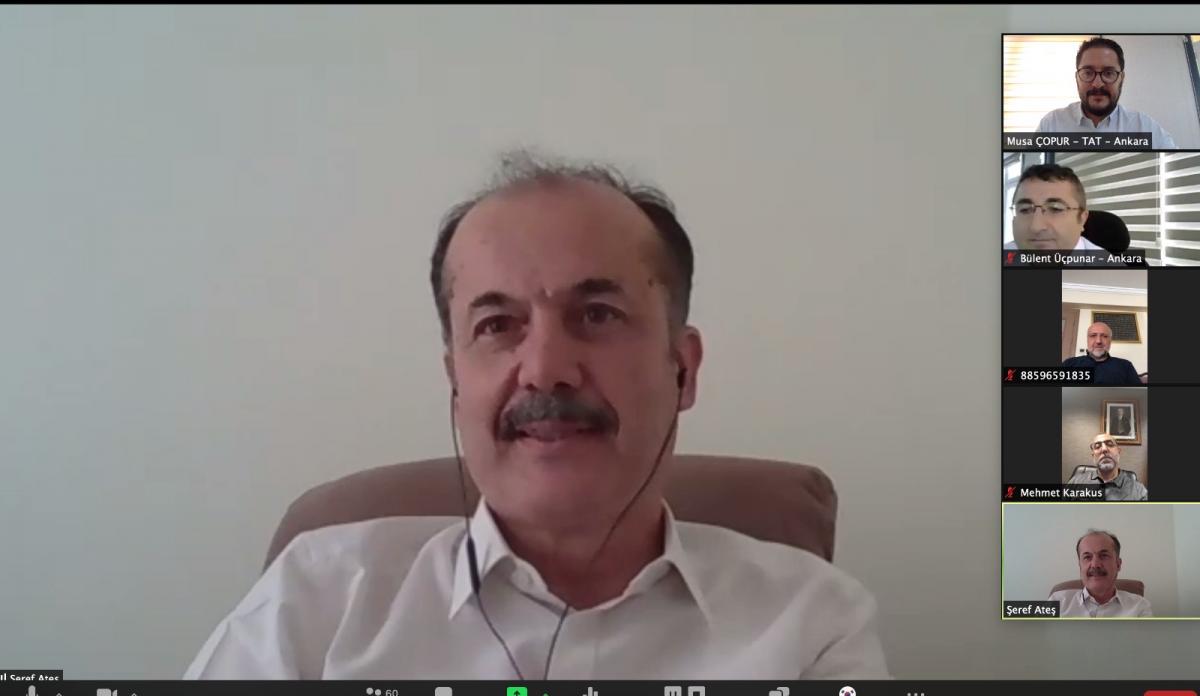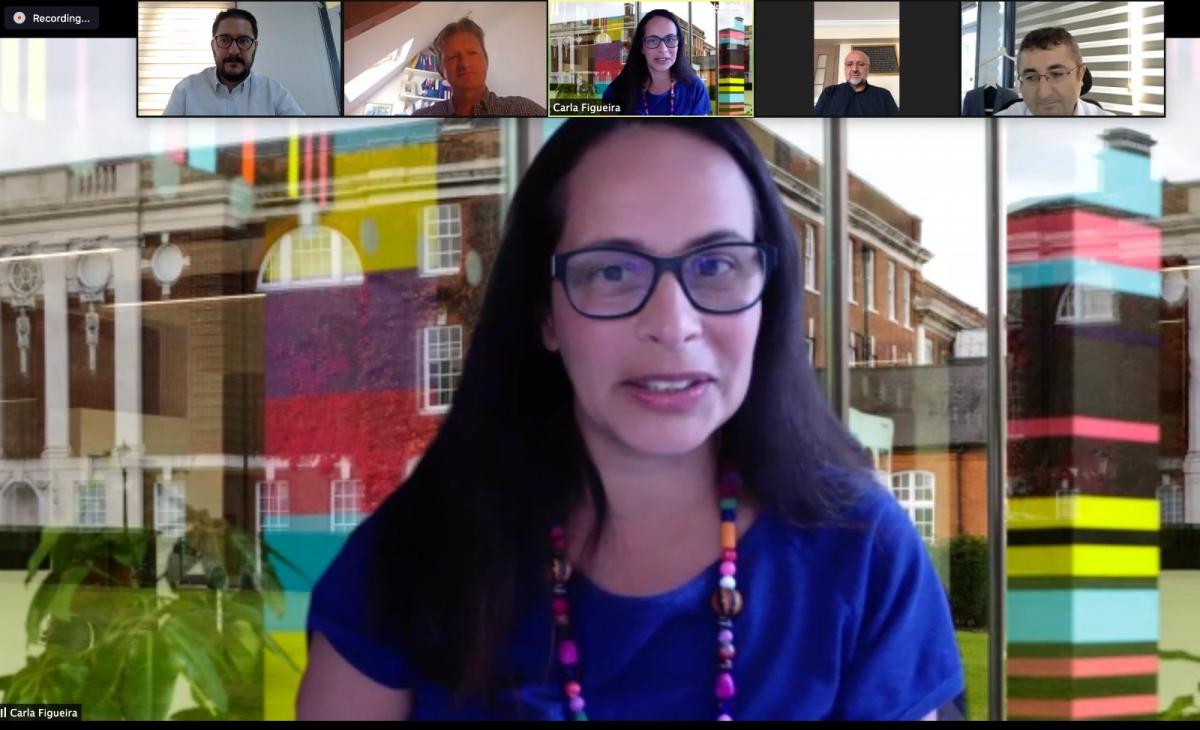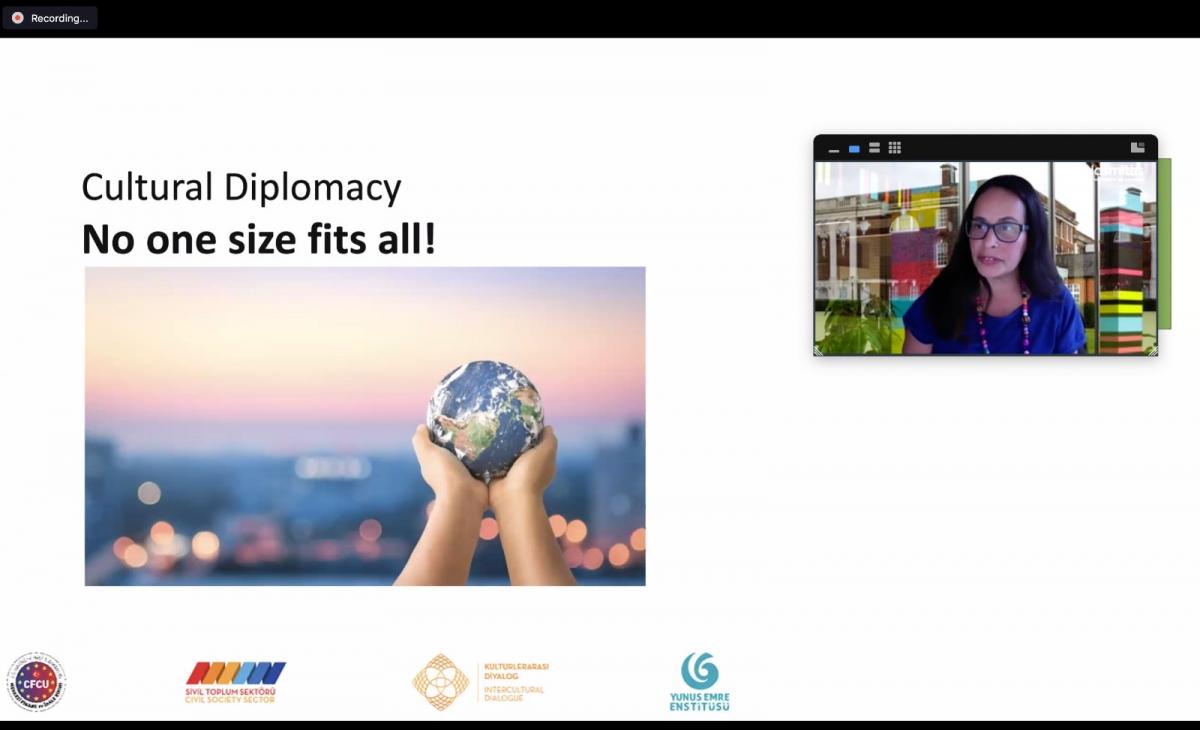Intercultural Dialogue Digital Training Started
Yunus Emre Institute has initiated the Intercultural Dialogue Digital Training Courses under the EU-Turkey Intercultural Dialogue Programme. The training, which is initially carried out as a pilot, will reach more than 400 staff members of the Institute around the world.
 As well as a series of cultural projects implemented through the EU-Turkey Intercultural Dialogue Programme, activities to support Yunus Emre Institute in enhancing various skills in several areas are ongoing. To this end, Intercultural Dialogue Digital Training has started primarily for the Yunus Emre Institute headquarters in Ankara and cultural centres across Europe.
As well as a series of cultural projects implemented through the EU-Turkey Intercultural Dialogue Programme, activities to support Yunus Emre Institute in enhancing various skills in several areas are ongoing. To this end, Intercultural Dialogue Digital Training has started primarily for the Yunus Emre Institute headquarters in Ankara and cultural centres across Europe.
The training courses, which will be conducted first as pilot, will then reach more than 400 staff members of the Institute centres all around the world online in 2021.
The training courses focus on cooperative project development and management; resource mobilisation, communication; monitoring and evaluation. On the other hand, another focus of the training will be strengthening the knowledge and competencies of the staff playing a role in Turkey's cultural diplomacy in various countries, which would enhance their Intercultural Dialogue activities. The Institute staff who will participate in the training will also seize the opportunity to develop intercultural dialogue project proposals and create communication strategies to ensure the outreach of these projects.
Strategy Development and Corporate Communications Director Bülent Üçpunar, who took the floor in the first session of the Intercultural Dialogue Digital Training, stated that they implemented the first course of this training face-to-face in Ankara, however after the pandemic they continued in digital platform.
“WE NEED TO STAY UNITED NOT APART”
 President of Yunus Emre Institute Prof. Dr. Şeref Ateş expressed the following in the opening remarks of the training:
President of Yunus Emre Institute Prof. Dr. Şeref Ateş expressed the following in the opening remarks of the training:
“We are going through a challenging period. I highly regard this project, which we have been following significantly for the last two years, particularly in this challenging period. Because, what this pandemic showed us is the thought of unity. All kinds of formations that ensure unity, that incorporate unity, making one, are to the benefit of the humanity. That is why it is precious to be both a stakeholder of the EU and to implement the project. Especially intercultural communication and dialogue is precious. In this period, we understood that even though we have different cultures, we all have common problems. We need to stay united, not apart.”
“INSTITUTIONS ARE NEEDED TO ACTIVATE THE LOVE”
Expressing that the culture and arts activities of the Institute mainly aim at actions that enhance people or guide them towards goodness, Prof. Dr. Şeref Ateş added:
Prof. Dr. Şeref Ateş: Although different voices may emerge in crisis times, in the world opinion the people of culture should actively have a mindset that prioritises constant peace. |
should actively have a mindset that prioritises constant peace. This is the thought of unity. According tu us Muslims, the divine will shows the same unicity to all nature, people, cultures. That is why we "Love the Created because of the Creator" to reach this unicity. Well, how can this love be activated? There, structures and institutions are needed. The culture of working together is needed. Us being here together today, demonstrates this. We, as colleagues in different positions in different countries, come together. We improve our skills in working together and we work with people from different cultures and languages. Therefore, this project is precious, we need to have this perspective as well. My advice to especially Yunus Emre staff is that this activity is important not only as a task, but also to be able to see the unity in the creation of the humankind.”
DOORS OF THE HEART SHALL OPEN IF YOU INSTIL MEANING IN WHAT YOU DO
Stating that the project topics of “intercultural dialogue, project management, governance and networking" should not be regarded as ordinary tasks, Prof. Dr. Ateş continued his speech by saying:
“When you instil a different meaning in what you do, culture would open its doors and language would open its doors for you. Then, just as we said, the heart would open its doors. When there are harassments, provocations all around the world, in the European Union, in this vast geography, we are coming together, we say we want to carry out projects, develop these projects and manage them together". Let us show what is good and beautiful through culture and arts. For this purpose, how can we create communication, how can we enhance dialogue... How can we develop mutual understanding? These meetings shall ensure this deep meaning which will go beyond technique".
WE INCREASED OUR ACTIVITIES DESPITE THESE CHALLENGING TIMES
Emphasizing that there have been several achievements despite some challenges during the pandemic, Bülent Üçpunar elaborated on these achievements as follows:
One of the most important things that Corona brought to our Institute has been an increase in the Institute's activities in all fields. We did not have digital classes before in the area of Turkish, we had digital education. We now have digital courses in many countries where we do not have cultural centres. Tens of thousands of people learn Turkish in these centres. The experience we gained on this platform allowed us to deliver our in-service training programmes, our external training programmes with the perspective of an in-class delivery.
Simon Forester who is providing support to the project said:
"The training course is a part of the Intercultural Dialogue Programme co-funded by the European Union. The training platform has been designed to allow self-learning of trainees. The training course has been planned directly for the staff of Yunus Emre Institute. We planned a very interactive training course. There are many videos, articles and advanced learning content uploaded on the training platform. More than 20 training experts contributed to this."
FOCUS SHOULD BE ON DIALOGUE CHANNELS

Director of the Masters Programme on cultural policies, relationships and diplomacy in University of London Goldsmith College, Dr. Carla Figueira referred to the relationship between cultural diplomacy and intercultural dialogue. Dr. Figueira said that it is vey important to focus on intercultural dialogue and that it is a matter of approach. Stating that the main focus in intercultural dialogue is countries, cultures and people, Dr. Figueira indicated that the purpose is to protect cultural pluralism. Dr. Figueira continued her speech by saying:
“If we see cultural diplomacy as a method for countries to interact with each other, if we have an intercultural dialogue approach, we would focus on developing and maintaining our relationship. Therefore, dialogue channels should be created, repaired and maintained both among people and among groups."
THIS PERIOD IS ACTUALLY A GREAT OPPORTUNITY

Pointing out to the fact that cultural diplomacy operates in a very different world, Dr. Figueira emphasized that we are in a more digital world where very different and highly interdependent powers are interacting with each other. Dr. Figueira said: "Just as Bülent Bey emphasized, Covid-19 forced Yunus Emre Institute to be more active in the digital world. Yunus Emre Institute hosted some online conferences. In this way, you can reach a much wider area and I think this is a very important opportunity. Although we are going through a challenging period and it is difficult for everyone in different ways, this is also an opportunity. It is an opportunity to do certain things differently and also to reach much more people at the same time.

